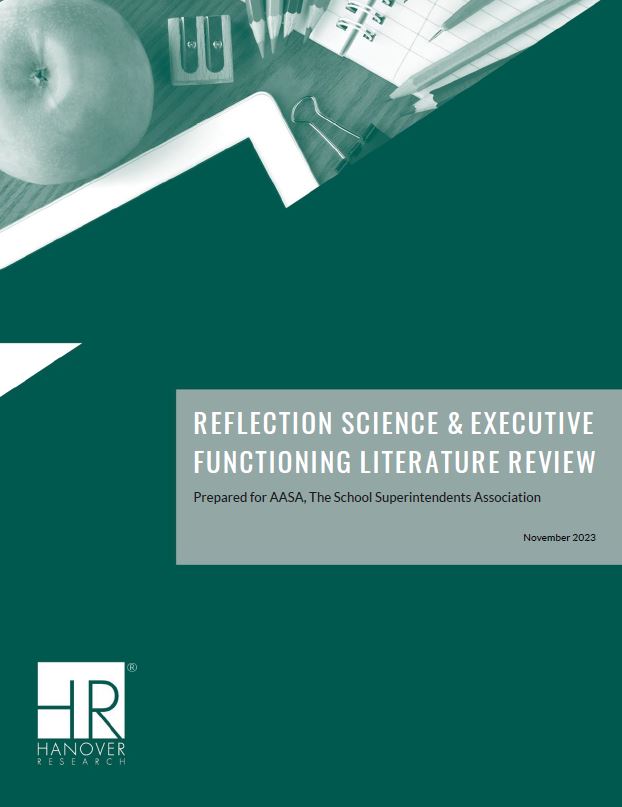Reflection Science & Executive Functioning Literature Review
November 18, 2023
Strategies for improving leaders' resiliency and resonance skills through self-reflection

AASA aims to enrich its existing resource pool for superintendents by incorporating practical examples that demonstrate how current or recent superintendents have effectively utilized their skills and strategies for leadership. This includes implementing change, enhancing learning environments, uniting communities, boosting academic success for all students, and building sustainable, efficient, and effective educational systems in any context. Furthermore, leaders require guidance on how to learn from the experiences of successful leaders. By applying reflection science concepts, including those related to executive functioning, leaders can develop their abilities through systematic reflection on case studies of current or recent leaders. To support AASA’s efforts in supporting superintendents’ leadership capabilities, Hanover created the following literature review exploring how executive function and reflective practice can support educational leaders in being nimble, resilient, and resonant.
This report includes the following sections:
- Section I: Executive Functions offers in-depth understanding of the complex cognitive processes that make up executive functions and their role in promoting nimble leadership; and guidance for leaders on how to apply skills to enhance nimble leadership.
- Section II: Reflective Practice combines academic research and practical advice from leadership experts, providing strategies for improving leaders' resiliency and resonance skills through self-reflection.
Key Findings
- Effective leaders excel at nimbly solving high-stakes problems that do not have ready solutions. They accomplish this, in part, through executive function. According to foundational executive function researcher Philip Zelazo, executive function is ‘the conscious control of thoughts and action.” Executive function helps leaders nimbly accomplish multi-step, ambiguous, or complex tasks associated with their jobs. The skills people use to executively function help them regulate their ability to pay attention and consciously decide where to direct their attention. When people are able to control where they direct their attention, they are better able to take conscious steps to accomplish their aims.
- Flexible leadership simulations with reflection components can help leaders grow in their executive abilities and nimble leadership skills. A 2022 study by Paul Balwant measured 72 students’ ability to grow in their leadership skills through a simulation and subsequent reflective essay. Quantitative study findings demonstrate that after the simulation and reflection, participants perceived skills and abilities increased significantly. Crucially, participants recognized the significance of adaptable leadership and articulated strategies for implementing a nimble approach.
- According to Philip Zelazo, the ability to reflect is crucial for individuals to lead nimbly through executive function. Reflection gives individuals mental space to think about their goals and determine the cognitive strategies required to achieve them. In executive functioning terms, when people are reflecting, they are planning on how they will direct and regulate their attention in the future while simultaneously strengthening those skills in the present moment. Reflection can help people take a pause before they respond to emotionally heightened situations and generally develop a greater awareness of their behavior and emotions.
- Reflective practice researchers Noemie Le Pertel, Jonathan Fisher, and Nick Van Dam link reflection with resonance, explaining that people require reflection to shift embedded ideas and beliefs. From a neurological perspective, the act of reflection loosens the neural connections linked to limiting beliefs and substitutes them with new connections related to preferred ideas and beliefs. The reflective process of creating new neural connections helps people foster more empathetic outlooks and behaviors.
- Research finds directed self-reflection can help leaders build resiliency. Researcher Remy Jennings and colleagues conducted a study in 2021 to explore how regular self-reflection can positively impact leadership ability. Jenning's research concludes that daily reflections on one's "best self" foster leadership resiliency, particularly in the areas of assistance and visioning, by promoting a more positive attitude. Reflecting on clout also helped leaders feel confident in their positions by feeling more adept at their daily tasks. Research authors conclude best-self reflections are effective in improving employees’ leadership resiliency skills.
- Resonant reflection structures that exist outside traditional learning settings can be especially helpful for adult learners. Reflection is both a cognitive and a physiological phenomenon. Contemplative practices are often effective in achieving this goal of combining cognitive and physiological reflection. For adult learners, reflective practices that consider physiognomy can be particularly beneficial. This is due to the fact that adults often have deeply rooted experiences and beliefs entrenched in their neurobiology, which they can reassess using a fresh approach. Contemplative practices are often effective in achieving this goal of combining cognitive and physiological reflection.

About Hanover Research
Founded in 2003, Hanover Research provides high-quality K-12 research & analytics through a cost-effective subscription model that helps executives make informed decisions, identify, and seize opportunities, and heighten their effectiveness. We do this by providing actionable data, insights, and guidance to educate the whole child with solutions in curriculum & instruction, diversity, equity & inclusion, academic program planning & impact, district strategic planning, teacher recruitment & retention, operational planning and culture, climate & family engagement.
Advertisement
Advertisement
Advertisement
Advertisement



.png?sfvrsn=4c43367e_7)